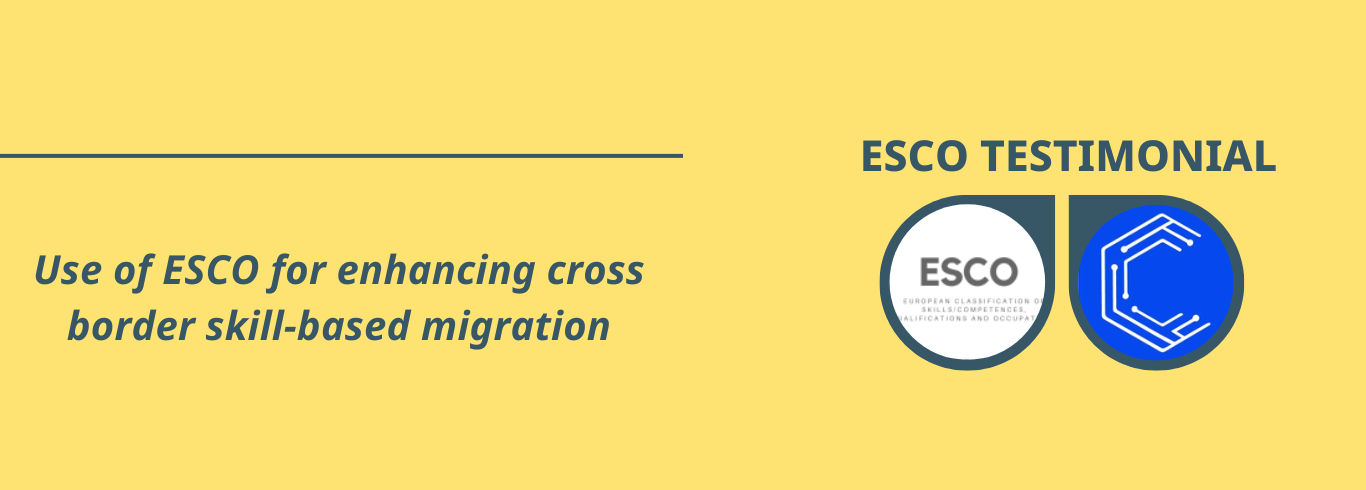Certif-ID using ESCO as the principal taxonomy
ESCO testimonials

The following testimonial is part of a series of interviews conducted by the ESCO Secretariat with ESCO implementers. Their purpose is to shed a light on ESCO strengths and challenges as perceived by implementers, so that current and potential future stakeholders can gain a better knowledge on the use of ESCO. In this testimonial, we discuss how Certif-ID has been using ESCO as the principle taxonomy of a platform which enables cross border skill based migration.
Tell us a bit more about your organisation.
Certif-ID is a German based startup founded in 2021 which strives to enable cross border skill-based migration. With our platform for skilled workers and blue-collar talents, we enable candidates to create digital, skill-based profiles and become visible for employers internationally. Today we have 63.000 Talents from 10 different countries listed on our platform. We currently enable skilled migration to Germany and Eastern Europe from 3 continents.
How do you leverage ESCO in your services and since when are you using it?
Certif-ID integrated ESCO as the principal taxonomy of the platform. We map an individual's education and employment history to ESCO to create a rich skill map for each candidate. This forms the basis of our matching and ML engine that support candidates and potential employers to understand the skills and competencies of individuals and map further learning and development pathways.
What were some of the challenges you encountered in implementing ESCO?
ESCO provides excellent market driven insights into the skill and competency requirements of differing occupations. From a business perspective there is often too much data, and one of the challenges is how to differentiate the ‘essential and ‘optional skills and enable employers to prioritise the skills required for differing job roles. From an individual perspective, it is challenging for candidates to navigate between the many possible professions and skill requirements.
What is the key ingredient in ESCO that made you take the decision to use it in your system?
Due to significant variations in educational standards that hinder the comparison of degrees between EU and non-EU countries, evaluating professionals based on their skills presents new possibilities. ESCO provides a benchmark for identifying the skills that professionals from third countries possess and that can support matching to available job opportunities. We are utilising ESCO to build independent skill assessment into the platform and enable employers to harmonize job descriptions aligned to the ESCO framework. This approach underscores the value of ESCO as a standardized and dependable framework.
What was the level of acceptance by your partners/other national stakeholders?
Despite the initial unfamiliarity of most of our partners and customers with ESCO, our implementation of it for international cross-border recruitment has received widespread acceptance and overwhelmingly positive feedback. We work closely with government and industry associations in India who see this as a great reference to enable upskilling and development of candidates in the country.
What are some of your recommendations for other stakeholders looking to implement ESCO in their system?
Implementing ESCO for international recruitment of blue-collar professionals requires some form of validation which comes either from the talent side or from the partner agency side, to make sure that the skills the talent is associated with, are applicable. Familiarise yourself with the ESCO classification, including its hierarchy, the relationships between skills, competences, qualifications, and occupations, and how it can be applied within your specific context. It is also important to inform and align with different stakeholders to ensure adoption.
How has ESCO helped your business/organisation? What are its advantages and disadvantages from your standpoint?
ESCO has enabled us to address the critical challenge of standardising the comparison of skills and qualifications globally. It has emerged as a fundamental element of our business strategy, demonstrating its worth as a rich source of data from which we can derive meaningful insights. This framework plays a key role in fostering trust with employers by offering greater clarity about the capabilities of the talent they intend to recruit.
